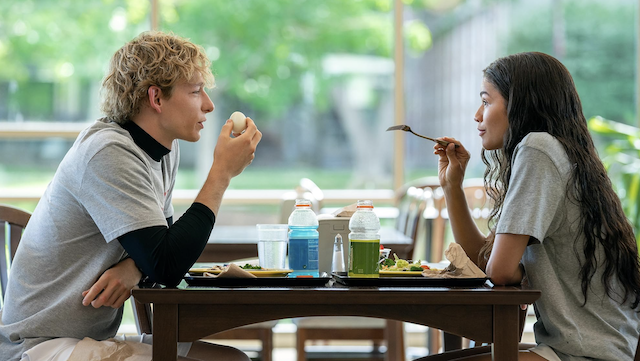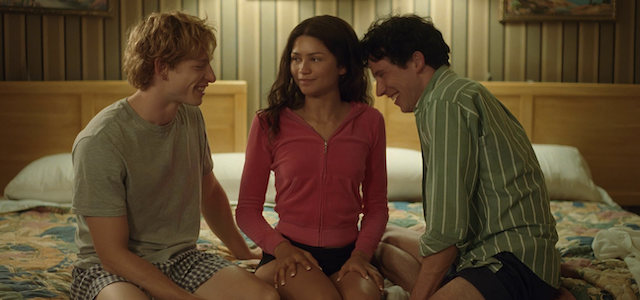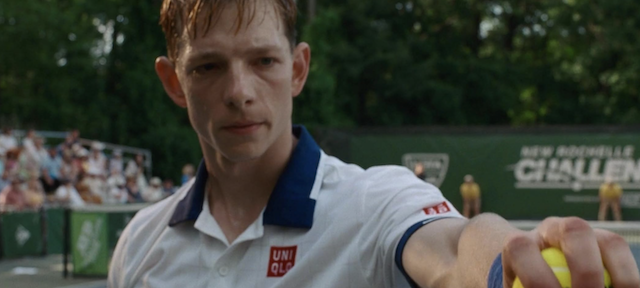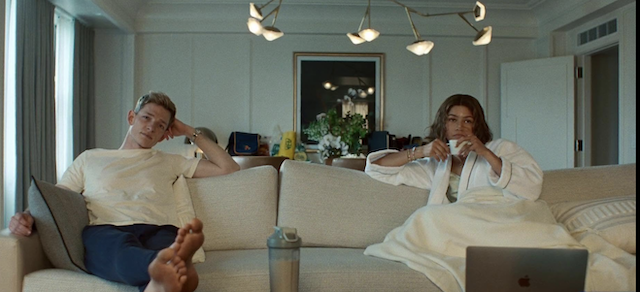
@Courtesy of Amazon MGM Studios

Q: Tashi is such a layered and complex character. How did you prepare to embody her, both as a former tennis champion and the emotional intricacies of her relationship?
Zendaya: Obviously a lot of tennis training, which was quite nice. We had the luxury of rehearsal time, which was really special. Being able to sit down with Justin in the room and ask all the questions that we needed to ask, talk through everything, get to know these characters in a deeper sense and put scenes on their feet.
When you’re rehearsing, that is the best way to start to find the answers. That’s when the real character starts to come alive. And also through hair, makeup, and wardrobe as well. We are one piece of the character, but there’s so many hands that make a character exist. Figuring out their journey through their hair, through their makeup, through their clothing, was also important.
How you feel in a particular costume can really change your performance. Luca Guadagnino has a real beautiful understanding of characters, he doesn’t judge them, he allows them to be exactly who they are, he wants everyone to be messy and complicated, but empathetic.
Q: Whenever you get excited about a project, you just dive right in. How does that acting methodology help you bring your characters to life?
Mike Faist: I don’t know if it’s actually methodology. I’ve never wanted to be an actor as a source of income. I never cared about fame. I always wanted to do this, so I moved to New York to do theater because I loved it. When I read a script or I am considering a role, I’m going off of this compulsion that I feel. When I read something and I feel that overwhelming sense to be compelled to do it, I just get excited.
And then there’s this thing that makes me really question why am I so excited. What is it about this role or this story that makes me so excited? What is this magnet and this drawn? I believe that the best way to get into a role, to figure out the thoughts and the understandings of another human being is by silencing the noise around yourself. It’s important to create an environment and a space for yourself to just be quiet, to start to really consider what those thoughts are and think about the role.
Q: What was your most memorable moment about working with Luca for this movie?
Zendaya: There’s many memorable moments. He just has certain funny little things and mannerisms that I enjoy imitating. It’s probably annoying to him. I really enjoyed the process of making this film because of the very talented people that I got to work with and learn from. Something that I enjoy doing on any set, whether I’m producing or not, is showing up on days where I’m not supposed to work, just to watch.
I can learn so much just by watching the process happen. I love filmmaking, it fills me in such a beautiful way. I have so many great memories just watching specifically on the days of the long tennis stuff. Every shot was storyboarded and planned and thought through. I was really impressed with how he was able to keep the emotional intensity alive, track the tennis, make it look beautiful, but also know where all these characters were at any given point. I remember one of my early conversations with Luca about Tashi was about the kind of cream she uses and what she wears to bed.
There’s so many different specific things about a character that let you know who they are. Something he does so beautifully is he’ll give you a very specific action or note to do, and it might feel so incredibly weird, and you’re like, “That makes no sense. Why would I do that then?” and then you do it and you’re like, “Oh my God, that totally worked, and why wasn’t that my instinct at first?”
It made me think more about what a character can do in a space, it made me feel more open to the idea of trying things that might feel odd or different. He also edits in his head, which I think is really cool. He’s already editing the scene. That’s why he does two takes.

@Courtesy of Amazon MGM Studios
Q: Was there any specific training from your time in theater that helped you to embody the part?
Mike Faist: You’re still developing a character, you’re still doing scene work, and you’re still riffing and playing off of your scene partners and staying alive and present in the moment. ‘ve been really lucky in my career thus far, I’ve got to work on really exciting and original projects that forced me to figure out ways to develop a fully nuanced character.
It started when I was doing Dear Evan Hansen on Broadway, continued on in West Side Story, even though it wasn’t an original piece, we were attempting to reimagine it. And that continued with this, Luca loved this idea that art was extremely clean. Theater has had quite a tremendous influence as to my approach. We were so lucky to have that rehearsal period. It is kind of the most exciting time for me as well because I don’t have any answers yet. They’re forming. I want to figure out the pieces of myself that I didn’t know existed.
Zendaya: I’m a fake dancer, but Mike’s a real dancer. At some point I decided I was going to learn this choreography. That helped me a lot because I’m not going to be a professional tennis player. Looking at it through the lens of choreography, something that felt familiar to my body at least, I know that helped me a lot.
Mike Faist: You’re right. All we have as our instrument is our bodies and our voice. There’s only so much that you can actually do in reality as an actor, especially given only 12 weeks. I’m not going to be a professional tennis player, it’s not going to happen. But the exciting thing is to be able to wear someone else’s skin for a moment.
Q: People have called Tashi a villain because of her will. Do you believe that is a double standard, considering how men in sport are treated?
Zendaya: She’s not a villain. You’re not supposed to look at your character that way. My job is to emphasize with her, to understand where she’s coming from and to humanize her. She can be quite harsh and unapologetic in the way she goes about things.
It was my job to find where her pain is stored, the trauma of losing your career, the idea of never allowing yourself the time to grieve, being in a marriage where she’s in charge all the time, she’s making all the decisions, being accountable for two people. Her life, since she was a kid, has felt so incomplete, because this one true love, which is tennis, has been ripped away from her.
I empathize deeply with this idea of loss, because I love my job, I love what I do, and I couldn’t imagine it just all being taken away from me. I tried to put myself in her shoes, put myself also in a marriage that ultimately isn’t equal, they don’t feel like partners, it feels like one person telling another person what to do. It’s this deeply codependent feeling of needing the other person to fulfill something that you can’t fulfill on your own. What’s really beautiful about Challengers is that everybody is deeply flawed and makes mistakes, but they’re all making decisions, they’re all hurting each other, they’re all unhealed, lost and trying to get through.
Q: How has the experience of seeing Challengers become a pop culture hit?
Mike Faist: I’m probably the last person to ask, only in the sense that I’m not tapped into what is going on ever in popular culture. No, the truth is that it’s quite exciting. We all hope that our work is able to reach people. To be able to actually have an impact and reach those people, it’s gratifying to know that cinema will continue on, acting will continue on, these things will continue on.
Zendaya: I love movie making and I love filmmaking, but there also is a business aspect to it as well. People have to go see movies in order for them to get made, in order for filmmakers to have the budgets to make the films that they want to make. There was definitely a level of pressure of wanting this movie to have a sense of commercial success, because it is an original screenplay. It’s a completely new idea. Sports movies, it’s difficult to get people to go see them too. There’s nothing like the experience of being in a theater, with strangers, and experiencing a film on a screen in that way. That’s the way I prefer to see films. I want new up and coming filmmakers, directors, writers to have the opportunity to get their movie made on a screen and in a theater.
Mike Faist: And you’re absolutely right Z, there is kind of no other better way when seeing a movie than going to the movie theater with a bunch of people. When it is good, it’s like they’re sunken to the world and they feel it just on a heightened level. It brings a collective empathy. Everyone there, even though we don’t know each other, we’re laughing together.

@Courtesy of Amazon MGM Studios
If you like the press conference, share your thoughts below.
Check out more of Adriano’s articles.
Here’s the trailer of Challengers:

